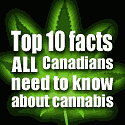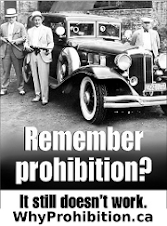Politicians are the people that make, shape, and write our laws. Why is it that many of them tell us "No, no, no." when they themselves puff, puff, passed...? And I wonder, how many great minds has our world missed out on because they had the unfortunate luck of being caught for simple possession and their true career paths were derailed because of a possession conviction?
Millions of good, otherwise law-abiding citizens use cannabis, we are only "criminals" because common men and women judge us as "immoral". What right is it of theirs as to impose their beliefs on us? When it comes to individual rights, we should be allowed to govern ourselves and our own bodies. Even if people don't always make the right decisions, (like drinking too much) they are our decisions to make, and we shall own the consequences of those decisions. (like the hangover and puking that can accompany too much drinking)
What I also do not understand, is how when alcohol, cigarettes and caffeine are legal, politicians dare to tell us that cannabis, which is proven to have killed no one ever, is "wrong" and "illegal" or "immoral". They are drugs too, which cause tens of thousands of deaths every year, if government was serious about "keeping us safe from ourselves" then many more substances, prescription drugs and activities (hockey concussion, anyone?) would be on the banned list and face criminal penalty.
We have learned from our own history that prohibition does not work, in fact, prohibition is unrealistic. It is just not possible. Humans are fallible and have been breaking laws since the most popular one was commanded (Don't eat the Apple!). Of course it is not right to harm others and laws that punish people for physically and financially hurting others are justifiable, but face it politicians, your constituents are not "perfect" - no matter how much you expect or want us to be.
We should be trusted though, an October 2007 Zogby Poll asked "If hard drugs like heroin and cocaine were legalized, would you be more likely to try them?
Posted in Chronicle Blog by David Borden on Wed, 12/05/2007 - 11:09am EDITORIAL ADVISORY -- December 5, 2007
If Heroin or Cocaine Were Legal, Would You Use Them? Zogby Poll Suggests Prohibition Doesn't Reduce Hard Drug Use
Washington, DC -- Marking the 74th anniversary of the repeal of national Alcohol Prohibition, StoptheDrugWar.org today released polling results suggesting that drug prohibition's main supporting argument may be simply wrong. Drug policy reformers point to a wide range of demonstrated social harms created by the drug laws -- crime and violence, spread of infectious diseases, official corruption, easy funding for terrorist groups, to name a few -- while prohibitionists argue that use and addiction would explode if drugs were legalized. But is the prohibitionist assumption well-founded?
Zogby polling data released today asked 1,028 likely voters, "If hard drugs such as heroin or cocaine were legalized, would you be likely to use them?" Ninety-ninety percent of respondents answered, "No." Only 0.6 percent said "Yes." The remaining 0.4 percent weren't sure.
You see, Politicians, we CAN be trusted to make our own decisions. Please stop treating adults like children. It's not your place to interfere in our lives: isn't that what the Canadian Charter of Rights and Freedoms states?
7. Everyone has the right to life, liberty and security of the person and the right not to be deprived thereof except in accordance with the principles of fundamental justice."except in accordance with the principles of fundamental justice." is where things get tricky. Some excerpts from The Parliament of Canada Web Site: (Please read the whole report, it is quite informative.)
A CONSTITUTIONAL ASSESSMENT OF THE CLAY TRIAL AND RULING
Andrew D. Hathaway, Ph.D.
Rights and Freedoms of Drug Users Under the Charter
The Canadian Charter of Rights and Freedoms (Part I of the 1982 Constitution Act herein referred to as the Charter) states that everyone has such "fundamental freedoms" as "freedom of conscience and religion" and "freedom of thought, belief, opinion and expression." No formula is provided, however, by which the selection of particular rights and exclusion of others might be explained. In this context, the right to use one’s drug of choice can be promoted in one of two ways: "First, such a right or freedom can simply be proclaimed as part of the basic rights package. If such a proclamation is lacking, the second possibility is to argue that a specified right, such as the ‘right to liberty’ guaranteed in section 7 of the Charter, extends far enough to cover the disputed action."
University of Western Ontario law professor, Robert Solomon accordingly observes:If the right to liberty in section 7 protects personal decision making (and it seems to me if the state wants to intervene, it should do so in a principled fashion), if they wanted to draw the barrier in terms of...life and death decisions and did it consistently, I could understand that, but it doesn’t…. I am overwhelmingly of the view that if section 7 allows you to die for your religious beliefs,...if a law prohibiting access to abortion interferes with your right to life, liberty, and security as a person, if the courts recognize a realm of private decision making in the area of health and autonomy, then there is no way you can justify our current laws criminalizing possession of many drugs which are now illicit.
Since the final report of the Le Dain Commission inquiry over a quarter-century ago, a legal-political stalemate has arisen around cannabis, leaving policy reform advocates in limbo awaiting the next opportunity to press the issue back into the judicial or political forum. Steadfast resistance on the part of our law enforcement institutions has proven all the more resilient in view of the apparent ‘easy out’ option available to policy makers in passing the issue back and forth between the two forums. Although constitutional challenges are expensive to launch and would seem to stand little chance of success legally, however, Osgoode Hall law professor Alan Young underscores their importance in maintaining the media spotlight and public attention, "...because the press is very interested in the issue, and if the press is interested and the public is interested, the politicians may have to respond."
Citing recent international developments in progressive law reform and a general interest in society regarding recreational drug use, Professor Young characterizes the 1990’s revival of the cannabis reform movement as a "Renaissance period" wherein (following the repressive drug policy "dark ages" ushered in by Presidents Reagan and Bush in the US) public discussion and debate on the issue has been able to ensue once more. Since interest in drug consumption and policy ebbs and flows over time, he suggests the timing of challenges may be crucial, and that today’s socio-political climate presents a prime opportunity for law reformers to take advantage of favourable public opinion and press coverage.While the date this report is written is not posted, I believe much of the same can be said today. With so much recent conversation regarding our prohibition laws, it is now our time once again to massively campaign for our right to use Cannabis responsibly. It must be now as Bill C-15 (UPDATE: Bill C-15 has been reintroduced as Bill S-10 and requires defeat in the House of Commons.) has been tabled into Parliament by Stephen Harper's Conservatives. While the Liberal Government is also tabling Bill C-359, (marijuana possession would still be illegal and people would receive a fine for small amounts of Cannabis) it is still not enough. Decriminalization does not stop the problem of the Black Market or the violence and drug cartel profiteering that comes from it. The only way to ensure our citizens true freedom and a safer country in which to live is to legalize Cannabis.
Will Bill C-15 kill the twin scourge of illegal drugs and gang violence?
Libby Davies, NDP MP, Vancouver East answers on Straight.com:
“There’s a lot of information, both in the United States and in Canada, that shows that mandatory minimum sentencing regimes for drug offenses are ineffective. This is all about window-dressing for the Conservatives’ crime agenda. They want to impress people with their tough-on-crime approach. One thing that will happen is that it could very much overcrowd our prisons. We find the bill to be misdirected and based on a very faulty premise. It’s based on the U.S.’s war on drugs, which has been a complete failure.”
Tomorrow, I will be joining an expected 25 000 people at the 11th. Annual Global Marijuana March. I'm hoping to be a part of history, a part of a movement that contributes to the end of prohibition. To me, persecuting Canadians who choose to use cannabis as medicine and for recreation is unethical and immoral. Our politicians must hear our cry for justice and legalize our gift from Mother Nature. Puff, Puff, Peace, everyone.... Pass It to The Left.
IMPORTANT UPDATE AUGUST 2011 - The Conservatives are now trying to pass all of their "Crime" bills in one large Omnibus Bill. Please visit www.cannabisacts.ca and whyprohibition.ca for more info. Thanks, MJ (Article updated August 19, 2011, as Ontario provincial Conservative candidate Tim Hudak has admitted he "grew up normal" and smoked pot.















Update August 2011 - The Mandatory Minimum Sentences proposed in Bills C-15 and S-10, are now being crammed into one giant "Omnibus Crime Bill" by the Conservatives, please visit CannabisFacts.ca and whyprohibition.ca for more information. ~Thanks, MJ
ReplyDelete